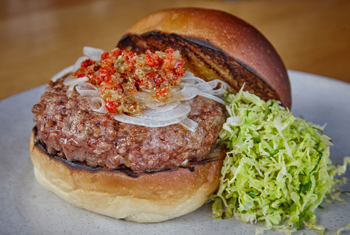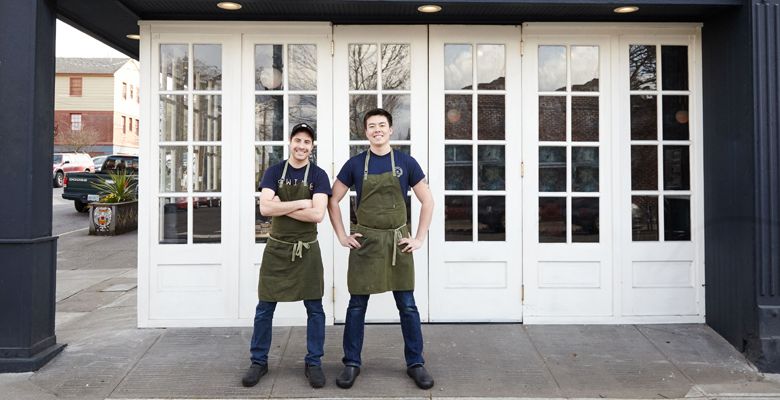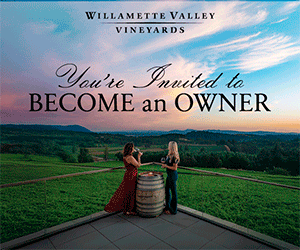Meat of the Matter
New butchery/restaurant dedicated to ethical animal husbandry
Food and wine culture has become more transparent over the years, and the benefits for consumers are many, including the heightened ability to make informed decisions amid greater knowledge and wider selection. For Pasture PDX, this concept represents the meat of the matter.
Kei Ohdera and John Schaible, owners of the new Portland butchery/restaurant, are dedicated to bringing fresh, humanely and sustainably raised meat to the city. Officially opened in February, the business stands on nurtured relationships forged with regional farms and ranchers who bring sensitive approaches to both the animals they raise and the environment they inhabit.
Prior to Portland, Ohdera and Schaible worked at renowned New York farm-to-table restaurant Blue Hill at Stone Barns. Together, they worked on the meat line in the kitchen. “It was there that we both tasted a retired dairy cow,” Schaible remembers. “The animal was over five years old and one of the cows from the Blue Hill Farm.”
The flavors haunted them. Schaible recalls the beef being at-once grassy, mild and rich. He says, “It almost looked like wild game in the density and darkness. Melty fat gave way to the beautiful lactic qualities of the meat from the cow’s age.”
After relocating to Portland, the friends reflected so fondly on that particular animal, they angled for a local program to utilize retired dairy cows, giving added value to older livestock. “Most cows, when they are barren or being culled, end up at auction for pennies on the pound,” Schaible says, “literally, 6 to 12 cents per pound, live weight.” They work with people like Mike Trent of Trent Family Farms in Cloverdale and farms in Oregon’s dairy wonderland, Tillamook County, taking on animals that would otherwise go the commodity route.
But, it’s about more than just access to flavorful cuts.

“A few larger plants here in Oregon go through so much product, the only aspect they end up worrying about is making sure they remain within USDA regulations,” Schaible says. This often means a stressful environment for the animals, and that strain rubs off on the quality of beef. He says this kind of meat often cooks poorly. He also believes it to be less nutritious than something coming from a less stressful, grass-heavy environment. “Meat that tastes more has more.”
Currently, Pasture PDX operates as part of the Dame Collective in Portland, a pop-up residency for local chefs at the wine bar of the same name. Schaible and Ohdera are hoping to eventually lease a small retail space of their own. “We really want to build a connection with the ranching community and the community here in Portland, so the symbiotic relationship can support everyone,” Schaible says. For them, that means shared knowledge relating to ethical meat sourcing, animal rights and wholesome cooking practices.
They work with a growing list of farms spanning the length of the Willamette Valley, including Carman Ranch, Blue Truck Produce and Groundwork Organics. Schaible says they visit the farms to see their process, looking at pasture conditions, and feeding and rotation habits. The two get genuinely excited about visiting the properties and gauging the health of the habitat.
One of their biggest concerns is overgrazing, something the American West knows quite well. Schaible points to the broader picture, beyond just trampled earth and dead grass. “It affects everything that lives below and around it. Overgrazing affects the way water can reenter the soil, so rotation is so key to clean ranching and farming.”
Another respectable aspect of the Pasture PDX stance is its zero-waste policy. They use every part of the animal, from nose to tail. They turn the trim and bone into stocks, sauces and broths. Fat is rendered into cooking oil. The cleaned trim meat becomes sausages.
In addition to beef, the outfit works with lamb and pork with the same mentality. Pig skin is turned into chicharrones; pork offal, into chorizo. Both chefs draw from their collective, extensive food experience. Schaible was raised in Montana in a large family with close ties to hunting and butchering. Born in Japan, Ohdera worked at Ryugin in Tokyo, a three-Michelin-star restaurant, and for a stint at Farm Spirit in Portland.
The way Pasture PDX approaches farming is a lot like what we’re seeing in wine country. Winegrowers continue to access — and ideally improve — vineyard conditions in quest for better fruit and responsible stewardship of the land. As climate conditions harshen and natural resources become precious, this mentality becomes all the more vital. Production for production’s sake is as bad in wine as it is in ranching and farming, with few beneficiaries.
In the end, the two feel fortunate to work with such animals and are incredibly excited to be sharing their work via a biweekly meat-share program at Dame Collective, fit with steaks, braising meats, ground beef and cured sausages.
“Part of the responsibility of taking an animal’s life is not wasting it,” Schaible adds. “And we take that to heart.”
As Schaible looks for a permanent home for Pasture PDX, he can’t help but think about what might be next. “Maybe a restaurant and a fresh sausage company,” he thinks aloud.











